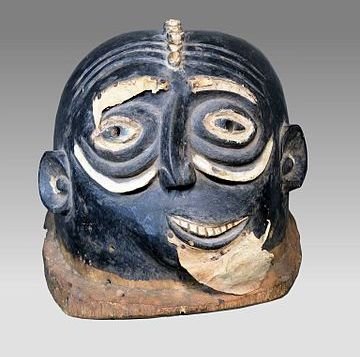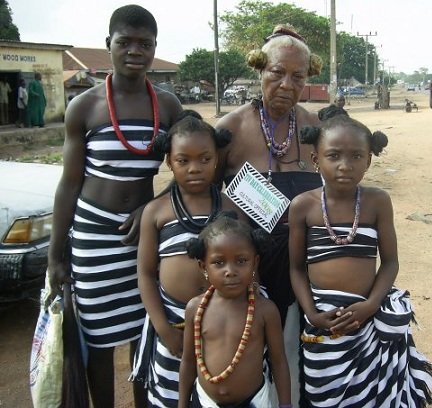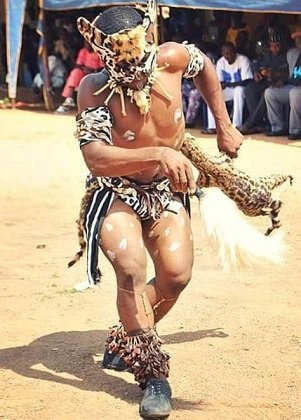Hey buddies, hope y'all have been having fun with the history of Northern Nigeria. So far, we have discussed about 5 ethnic groups in the Northern part of nigeria. Remember, in our last post, I mentioned "Tiv" ethnic group in passing. Here, we will look at this ethnic group in details; their origin and socio-political organization before the colonial era, then we'll connect it to this present era.

Tiv Ethnic Group
Tiv is also referred to as "Tivi" by many. Tiv is considered as the biggest ethno-linguistic group in the middle part of Northern Nigeria (over 7 million people - according to 2006 population census in Nigeria). Much more than this, Tiv does not only have significant population in Nigeria, a very large and significant population is found in Cameroon. Some minority are found in D.R Congo and Benue basin.
Tiv people are well known for commerce and trading, though some living around the Benue basin are more into fishing and farming. Tiv has one of the most unusual but unique traditions and cultures in Nigeria. By this, I mean that, their cultures are exclusively preserved of them and they do not share them with other ethnic groups (unlike the Hausa and some others that share cultures with other ethnic group); this can be visible in their cuisines, traditional practices, music etc. For their traditional musical performance, they have their own musical instruments: "Adiguve" - this is a stringed instrument used mainly by ordained musicians in Tiv and by messengers to make important announcements like the coronation of a king, death of dignitary etc. There's another one called "Gbande" - This is a percussion instrument made of carved wood. Tiv people believe they can use the sound from this instrument to communicate with spirits from the land beyond.
Talking about dressing and attire, Tiv is the only Northern ethnic group with a recognized national attire which is white-and-black strip fabric. This has made it very easy to spot a native Tiv person in any traditional occasion. The fabric was launched at the early days of the origin of Tiv as a way to honour the zebra (which is regarded as the symbol of their traditional and cultural heritage).

Origin of Tiv
The exact origin of Tiv has remained largely unknown just like some other ethnic groups we have reviewed, though there are pointers to show us some history as regards the origin of Tiv. Among these pointers is "oral tradition". We will look at some recognized origin of Tiv.
The Version of Takuruku
This is partly a creationist account and partly a migratory account. There is a general belief that the almighty creator sent one of his messengers called Takuruku (also called "Awanje", "Shan" and "Karagbe") who has been believed to be the first and true ancestor of the Tiv people. Takuruku wandered through the Sahel savannah, Sudan savannah, West-central Africa and parts of Sub-saharan Africa until he found the Northern part of Nigeria and parts of Cameroon where he later established a base.
During his period of wandering, he got married and had two children known as Ichongoa and Ipusu. From these children, Takuruku had many grandchildren; Turan, Mase, Gando etc, which now represents the various kindreds in the land of Tiv. By inference, all the kindreds of Tiv came from the children of Takuruku.
Till this present time, Tivs still recognize Takuruku as their ancestral father and they have special celebration to honour him (and other Tiv ancestors) once a year where the locals would normally appear in their white-and-black attire.
The Pure Migratory Account
This particular account does not recognize Takuruku and a messenger from the almighty creator and as their first and true ancestor but they recognize the pattern of migration from Sudan savannah region of Africa through the mountains of Cameroon. Takuruku only joined the migration from Sudan savannah as one of the immigrants, not as a messenger sent from the almighty creator. Well, the common denominator in both accounts is "Takuruku". While they journeyed, they crossed paths with the Fulani and they established a relationship with them, this was how parts of Tiv got Islamized. Though traditional religion is still practiced in Tiv, but Islam and Christianity is also practiced.
After Tiv established a base, they were much bigger and had a bigger land area covered, but the Jukuns contended with them over some parts of the land; saying that it was originally theirs. The Jukuns won the combat and seized parts of the land. The clash between Tiv and Jukun has almost never ceased and has been a recurrent issue.
Tiv Administration and Socio-political Organization
Tiv people practise a very decentralized and segmentary system of government where leadership is based on kindred level and elders are seen as the fulcrum upon which leadership hinges upon. Each kindred is headed by Mbavessen (who is normally the eldest in the clan). A leader is normally appointed over the group of Mbavessens to oversea the activities of Mbavessen.
Tiv people have respect for family and attach a significant importance to blood relationship and brotherhood - this is due to the fact that there is a popular belief in Tiv that all of them came from a shared ancestry. They also believe in hierarchy of authority where the eldest in the clan commands more authority than others. The hierachical order goes like this: from Nuclear family to the bigger extended family, then to the kindred and finally to the clan - which makes up the entire Tiv ethnic group. This is why history scholars have said that Tiv people have more genealogical and lineage affiliation than other ethnic groups in the Northern part of Nigeria. As a matter of fact, their leadership is based on genealogy and their system of government have been maintained even till this present time.

During the pre-colonial time, Tiv people had no recognized titled nobility like other ethnic groups, and they had no crowned chiefs nor elected administrators, their leadership was based on genealogy, lineage, and age - this system has been partly maintained even till this present era - though some forms of traditional institutions have been formed, but on the overall, Tiv is known for genealogical system of government.
Authored by @samminator
Click the coin below to join our Discord Server
)
Very nice post. I've learned a lot today that I never knew. I didn't know that the national attire of the Tiv people is white and black. Also, I've heard of the recurrent fight between the Tiv and Jukun people, but I never knew the cause of the fight. Also, I've heard of the instruments Adiguve and Gbange but I never knew it was associated with the Tiv people. I'm also just learning about their origin for the first time 'Takuruku'. This is truly a very informative post. Great work!
I'm glad to know that you learnt quite a few things from this history piece.
Thanks for reading bro
Very interesting post, as always!
I'm struck by the tenacity to preserve the lifestyles, cultures and forms of government of the Nigerian people you have been writing about. This gives me hope.
As I age I am wiser. So much good can come from our eldest having more say and power.
I love the zebra attire!
Yeah. The zebra attire is very unique, especially when it is worn in traditional occasions.
Thanks buddy
I love your posts about these villages in Nigeria.
I really liked Tiv his national dress that honors the zebra.
Wonderful.
The music being my particular interest, I'm glad you included two instruments.
I found a video of a traditional Tiv dance very beautiful.
I notice that not only the movement of the feet and the body also emphasize the movement of the eyes.
I couldn't find an image of the "Adiguve" just because it looks like a violin.
I wonder if young people know these instruments or will be lost in oblivion by using them only on special occasions.
Thank you @samminator for a good and rich information.
Thank you @adsactly for this excellent selection.
Wow! I'm so glad to know that you went to look out for the video of the traditional dance steps of the Tiv ethnic group. I know you were excited at their dance steps.
Thanks for reading
This is a fascinating factoid
The attire actually looks great. Quite elegant.
This summarizes the sad story of our peoples
Inhereted conflict whihc after several centuries people do not even know why they are fighting or who gets benefitted.
Regarding their socio-political organiation, I wonder, how do they get along with a central govenment (president, ministers, congresspeople, etc)?
They actually get along with the federal government very well. Central government doesn't have much influence on the traditional and cultural practices of ethnic groups in Nigeria, except when the practices contravene the law - but Tiv's attire does not contravene any law.
Thanks for reading buddy
I am really happy coming across this histories. I cant wait to see you talked about my tribe. I will be glad to see your publications on it and how far you know them.
As per the Tribe of Tiv, I have heard a lot about them and I just love their attire.
Thanks bro. I might have talked about your tribe when I reviewed Southern Nigeria. I may still revisit them again in details in the nearest future.
Thanks for reading bro
Although I'm from Nigeria it now sounds like I don't even know anything about my own country, lol
thanks for the detailed explanation of the Tiv people, learnt something new here today, no knowledge is a waste after all
Yeah bro, that's the idea; to reveal the history of Nigeria to Nigerians and to everyone at large.
Thanks for reading bro
This seems to me to be one of the ethnic groups of Nigeria, according to the ones you have presented to us, @samminator, more interesting. Perhaps because they have known (or been able to) preserve more of their traditions, according to your information.
There are several things that call my attention. In the first place, the coincidence of the mythical account of the origin of the TIv people with that of other ancient peoples; for example, in South America, there is the myth of the origin of the Quechuas (traditionally known as "Incas"), through a couple (male and female) of envoys from Wiracocha to find the land where they would found Cozco.
Also the genealogical way by which they came to reproduce, populate their lands and establish themselves as an ethnic group.
The special clothing, besides being attractive, connects us with that sense of the sacred that nature has for ancient peoples; in this case, represented in the zebra.
In addition to the genealogical hierarchy, it is interesting its autochthonous forms of government, which, apparently, maintain mechanisms of community control.
It would have been interesting to see images of the instruments and some of their music. Thanks for your good post, @samminator.
Many thanks Henry. Yeah, the attire is not just for cosmetic reasons but as a way of paying tribute to their ancient mythical zebra.
Thanks for reading buddy
@samminator, One thing is for sure and that is, many culture don't reveal themselves. But when we get to know about these cultures then it amazes us because it reflects Mystery and Uniqueness.
Posted using Partiko Android
I very well agree with you on that. The more you get to know some cultures, the more you realize how very little you have known about them.
Thanks for reading
Absolutely true words.
Posted using Partiko Android
Nice and educational history piece @sammimator. I never knew that Tiv people have national attire, though I normally see some of them on white and black, now I know why they were the cloth.
Thanks for sharing
Yeah bro. I'm sure you'd like to get some of the fabrics if you have the opportunity to go there. Lol
Thanks bro
Wow. I love this historical write up. I'm proud to be a Nigerian. Great work @adsactly
Posted using Partiko Android
It's an honour to know that you are proud to be a Nigerian.
Thanks for coming around bro
Thanks bro. One love.
Posted using Partiko Android
I Will definitely vote for you as my witness now. I learnt a lot from your great post always. I'm always waiting for your post every time. Thanks again. I will screenshot it to you as soon as possible.
Posted using Partiko Android
Hi, @adsactly!
You just got a 0.35% upvote from SteemPlus!
To get higher upvotes, earn more SteemPlus Points (SPP). On your Steemit wallet, check your SPP balance and click on "How to earn SPP?" to find out all the ways to earn.
If you're not using SteemPlus yet, please check our last posts in here to see the many ways in which SteemPlus can improve your Steem experience on Steemit and Busy.
Just when I thought I have seen it all, now I'm just knowing that an ethnic group in Nigeria has a dedicated colour of cloth for traditional festivals. Nice job @samminator